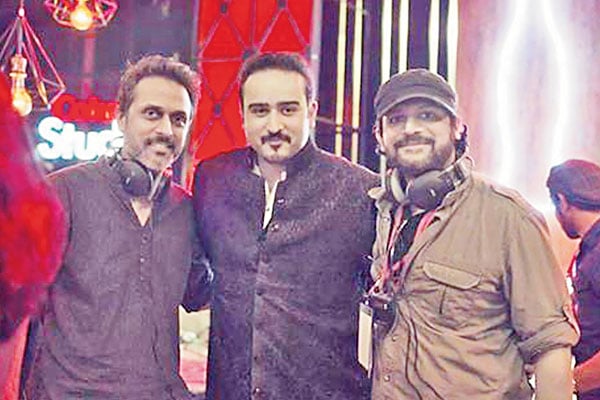Abbas Ali Khan has a career that has many dimensions, mostly positive ones. His original arrival came with a little known record called Humsafar but Khan truly made his mark in the music scene in the mid-2000s with Sun Re and never looked back.
At Karachi Literature Festival 2016, Abbas Ali Khan joined director Kamal Khan and artist Zohaib Kazi for a panel discussion on the music-book album Ismail Ka Urdu Sheher, which was moderated by Ali Safina.
MusicMix
Instep talks to the singer-songwriter about branching out as a film composer.
Abbas Ali Khan has a career that has many dimensions, mostly positive ones. His original arrival came with a little known record called Humsafar but Khan truly made his mark in the music scene in the mid-2000s with Sun Re and never looked back.
From showcasing his love for Sufism with the record Tamam Alam Mast to his collaboration with Zohaib Kazi on his debut music-book album, Ismail Ka Urdu Sheher to his entrance into the film music scene, Abbas, a fan of Abida Parveen and the Vital Signs, is a musician who is as versatile as he is soulful.
In a chat with Instep, the singer-songwriter, known for musical gems like ‘Malal’, explains the reasons behind his shift to scoring for films and what lies ahead...
Instep: Is it true that you’re completely shifting your focus towards composing and scoring for films, leaving behind your career as a singer/songwriter?
Abbas Ali Khan (AAK): Not at all. I plan to do both, side by side. I have already started working on new music and I am simultaneously working on scores as well.
Instep: You have worked on the score(s) of theatre plays Sawa 14 August and Siachen, both of which had an orchestral feel. In comparison, your score for the film Jalaibee took us back to the ’80s while Dekh Magar Pyar Se had a European feel. How do you add such variety and dimensions to your work?

Abbas Ali Khan made his Coke Studio debut in 2014, seen here with producers Bilal Maqsood and Faisal Kapadia (of Strings).
AAK: That is the beauty of scoring for film; you get the opportunity to work on many different styles and expressions. I think when I’m scoring, the visuals drive me and a lot of it depends on what the director wants. I have been very fortunate to work with directors who do not restrict me and are open to ideas. As a music producer, I have always experimented with various genres and that’s exactly what I do with film music.
Instep: When composing for a film, what inspires you the most?
AAK: First and foremost, the story. When I listen to the story I start getting ideas on how the sound or style should be. It further develops when I see the visuals and hear the dialogues. That’s when the magic happens.
Instep: What’s your personal preference: composing for films or composing for your own songs?
AAK: I love doing both; though when I’m composing for myself its more of a personal expression. The only person I need to satisfy is myself. On the other hand, when I’m composing for a film, I have to stay true to the story, the visuals and the dialogues.
Instep: Background score plays a crucial role in any film. But the amount of effort and attention to detail, that is put in background scores, can get overlooked by the general audience. Do you feel that somehow you hard work is overlooked?
AAK: It is true that the background score is not something that is as appreciated by a layman or gets as noticed as a song but that’s not even the purpose of it. Background score is there to accentuate and support the visuals, not overpower them and that’s why scoring is so tricky. When scoring for a film, a composer must create something that is compelling and memorable without taking away attention from the visuals and the story. When scoring for a film, I always spend most of my time working on a signature tune because that is the element that will make the music memorable.
Instep: Apart from film scores, do you compose background music for other things as well?
AAK: Yes, I compose for commercials, documentaries and theatre plays though I would love to compose for games given the opportunity.
Instep: Who are some of your favourite film composers?
AAK: Hans Zimmer, Sir John Williams, James Horner, Trent Reznor, Bruno Coulais, William Ross, Danny Elfman, Junky XL, Daftpunk (for Tron) and many more.
Instep: Other than scoring for films, have you lent your voice to upcoming projects?
AAK: I have composed and sung songs for the upcoming film Azad and I’m doing two more for another upcoming film called Punjabi Wedding Thriller.
Instep: What’s next in store for your fans?
AAK: More music videos from my album Tamaam Alam Mast, more films and more songs.